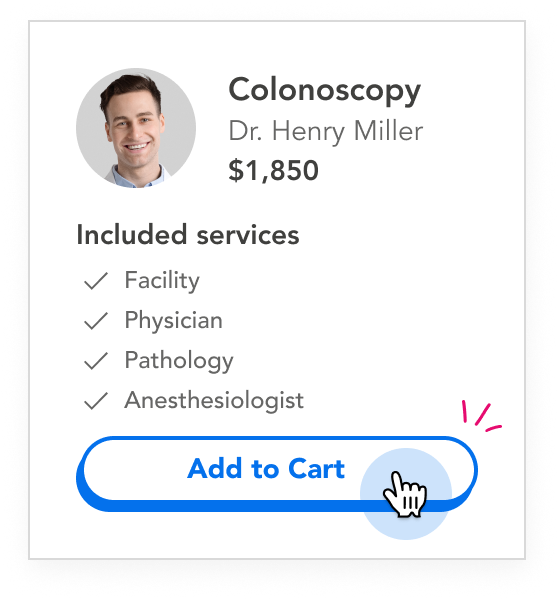HIDA Scan (Hepatobiliary Imaging) in Alabama
Save by purchasing this procedure online.
MDsave Regional Average
This includes a HIDA scan. This scan evaluates the liver, gallbladder, and bile ducts.
On MDsave, the cost of a HIDA Scan (Hepatobiliary Imaging) in Alabama, ranges from $721 to $1,115.
MDsave is an online healthcare marketplace where you can buy affordable medical procedures near you at one upfront price.
MDsave is available to anyone paying out-of-pocket and looking to save money on healthcare. No membership fees. No surprise bills.
Learn more about how MDsave works.
SORT BY
SELECT A LOCATION
{{ medical_provider_name }}
{{ doc_profile_specialty }}
{{#ratingComponent}}{{address}}
{{location}}
{{/isVideoVisit}}Item added to cart
Commonly Purchased Together
{{ total_price }}
Warning!
You have services from different facilities in your shopping cart. Procedures from different facilities must be purchased in separate orders.
Hello World
Multiple procedures performed during the same visit may qualify for a same session discount.
Get Care In Three Easy Steps
Compare Upfront Prices
Search by procedure and location to browse local providers and compare upfront pricing.

Buy Your Procedure
Pay for your procedure online or by calling (877) 461-2491. Or buy your procedure at the facility before your appointment is scheduled.

Receive Your Care
Follow the scheduling instructions given by your provider. Bring your voucher to your appointment.

Frequently Asked Questions
MDsave is a free-to-use, shoppable marketplace that allows you to compare transparent prices from providers near you and buy the service online. We partner with trusted local providers to offer quality healthcare at upfront, fair prices.
The procedure costs listed are bundled to include all related fees for your procedure. You pay one all-inclusive price with no surprise bills after your appointment. Every procedure is backed by the MDsave Promise: We will refund your payment in full if you do not receive care for your purchased procedure.
MDsave is available to anyone paying out-of-pocket and looking to save money on healthcare. At this time, we do not accept Medicare, Medicaid, or Tricare patients.
Your MDsave purchase may count towards your deductible if you have a high deductible health plan and are not on Medicare, Medicaid, or Tricare. Your insurance company will decide if your purchased procedure is eligible.
To submit your MDsave purchase for consideration to your insurance company, follow these steps.
Don't you know your deductible? Find out using our free deductible checker tool.
We accept Visa, Mastercard, American Express, PayPal, CareCredit, and many health account cards: flexible spending account (FSA), health savings account (HSA), or health reimbursement account (HRA) cards
For more information on payment and financing options, visit our FAQ page.
Patients Love
MDsave
It was a lifesaver. Because MDsave prrovided a cost-effective, very simple option to get an MRI, it was discovered that I have a cancer tumor...I paid 60% less going through MDsave than I would have had to pay for my insurance co-pay.

Robin
from Texas
I felt comfortable knowing that MDsave offers the MDsave Promise—if I purchased the wrong procedure or I didn’t have the procedure completed, MDsave would refund my money 100% back.

Stephanie
from Ohio
My experience with MDsave was amazing. They were and continue to be some of the most helpful medical care people I have ever dealt with. They even helped me by working with my cardiologist to add procedures that I was going to need later.

John
from Oklahoma
It was really easy! From searching my procedure on MDsave.com to printing out the voucher, it was easy and I did it in minutes. The site wasn’t hard to navigate, wasn’t confusing, and it was straightforward. I’m glad MDsave is here to help!

Mike
from Illinois
HIDA Scan (Hepatobiliary Imaging) in Alabama
Save by purchasing this procedure online.
A HIDA scan, also known as a hepatobiliary scan or a hepatobiliary scintigraphy, is an imaging procedure most often used to evaluate gallbladder function, but may also be used to diagnose gallbladder conditions like acute cholecystitis or other problems with the liver and bile ducts.1 The scan monitors the flow of bile from the liver to the small intestine.2
To track bile flow, small amounts of a radioactive tracer are injected into a vein in your arm, most often via an IV line. The tracer moves through the bloodstream to the liver, where it is absorbed by bile-producing cells. A gamma camera (specialized nuclear medicine camera) records the flow of the bile as it moves through your body and generates computer images of the organs as the tracer travels through them.3
The tracers used in nuclear medicine use no more radiation than routine chest x-rays or CT scans.4
Before Your Scan
- You will most likely be asked to fast for four to six hours before your scan.
- You may have to change into a hospital gown.
- Be sure to follow all of your doctor’s instructions about medicines before your scan, especially if you take pain medicine derived from morphine.5
During Your Scan
- You will be asked to lay on a table while the tracer is injected.
- Depending on the purpose of your hepatobiliary scan, you may receive another injection to make your gallbladder contract or to make it more visible.
- You will need to hold still while the gamma camera collects images, which typically takes about an hour.
- If additional images are needed, you may be asked to repeat the scan within 24 hours of the original. 6
Hepatobiliary scans typically have very few side effects. Be sure to tell your doctor if you are pregnant, might be pregnant, or are breastfeeding. Nuclear medicine scans are typically not performed on pregnant women to avoid risk to the baby.7
- Allergic reaction to injections
- Bruises at the injection site
- Small exposure to radiation
This scan is often used to evaluate how well your gallbladder is working, and diagnose conditions of the gallbladder, liver, and bile ducts. Some medical conditions or tests that may require a hepatobiliary scan include:9
- Cholecystitis (gallbladder inflammation)
- Bile duct obstruction
- Leaks or fistulas
- Bile duct abnormalities
- Assessment after liver transplant
- Assessment of gallbladder ejection fraction (rate at which the gallbladder releases bile)10
1 Mayo Clinic Staff. “HIDA Scan.” Jan. 6, 2018. https://www.mayoclinic.org/tests-procedures/hida-scan/about/pac-20384701
2, 5, 6, 7, 8, 9, 10 Cleveland Clinic. “HIDA Scan.” https://my.clevelandclinic.org/health/diagnostics/17099-hida-scan
3 Mayo Clinic. “HIDA Scan.”
4 National Institute of Biomedical Imaging and Bioengineering. “Nuclear Medicine.” Science Education. July 2016. https://www.nibib.nih.gov/science-education/science-topics/nuclear-medicine
